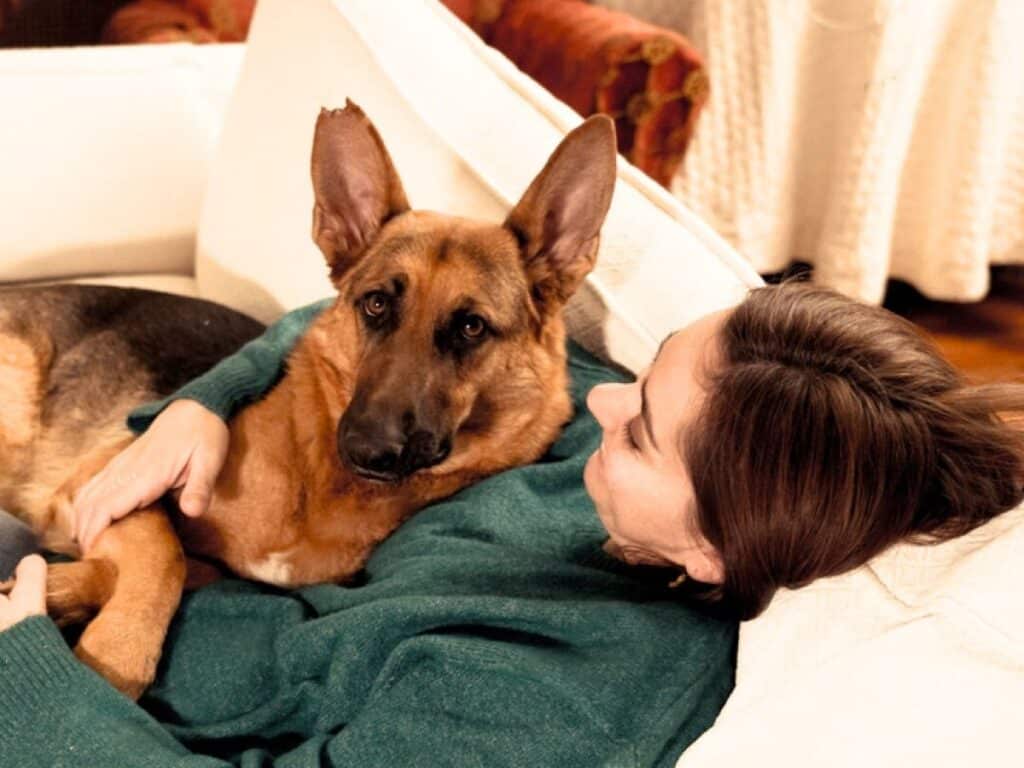Why are German Shepherds so clingy? I mean, seriously, you can’t even take a trip to the bathroom without your furry friend sticking to your side like a furry shadow.
Fear not, my fellow GSD owner, for I have embarked on a quest to unravel the mysteries behind our beloved German Shepherds’ clingy behavior.
In this article, I’ve got some surprising insights and tips to share that will make you appreciate their loyalty even more. So, let’s unleash the secrets, shall we?
Why are German Shepherds so Clingy?
German Shepherds are known for being clingy due to their pack mentality and strong bonding instincts. They seek companionship and closeness with their owners, often forming deep bonds.
Their protective nature can also contribute to their clingy behavior, as they feel responsible for their family’s well-being. Some German Shepherds may develop separation anxiety, leading them to seek constant reassurance and closeness.
Reasons Why German Shepherds Are Clingy & Needy

German Shepherds are known for their loyalty, intelligence, and protectiveness. However, some German Shepherd owners might find that their pets can be overly clingy and needy at times.
1. Protectiveness
One of the main reasons why German Shepherds are clingy is because they are naturally protective dogs.
They have a strong instinct to protect their human family from any perceived threat.
This protectiveness can manifest itself in different ways, including following their owners around the house or constantly seeking attention from them.
2. Need for Attention and Affection
Another common reason why German Shepherds can be clingy is because they need attention and affection from their owners.
They thrive on human interaction and enjoy being close to their people. If they feel neglected or ignored, they may become overly attached to their owners in an attempt to get more attention.
RELATED: Do German Shepherds Like To Cuddle?
3. Pack Mentality
As pack animals, German Shepherds have a natural inclination to stay close to their pack members, including their owners.
They see their owners as the leaders of the pack and feel a deep sense of loyalty and attachment.
This can result in a strong desire to be near their owners at all times, leading to clinginess.
German Shepherds may seek constant physical contact, follow their owners from room to room, or display signs of distress when separated.
Their pack mentality drives them to prioritize the unity and safety of the pack, reinforcing their clingy behavior as a means of staying connected and protective.
RELATED: Are German Shepherds Loyal To Their Owners?
4. Mental Stimulation and Exercise Needs
German Shepherds are highly intelligent dogs that require mental stimulation and regular exercise to stay healthy and happy.
When these needs are not met, they may become bored or anxious, which can lead to clinginess towards their owners as a way of seeking stimulation or comfort.
To prevent this behavior, it’s important for dog owners to provide regular exercise opportunities such as walks, runs or playtime with toys that stimulate both physical activity as well as mental engagement like puzzle games.
Free yourself from the constant neediness! The ‘Brain Training For Dogs Course‘ is the key to nurturing independence and confidence in your clingy canine companion. Enroll now for a more balanced and contented pet.
5. Separation Anxiety

Separation anxiety is a common issue that can make German Shepherds even more clingy.
When left alone, they may experience anxiety and distress due to the separation from their owners.
This can manifest as excessive barking, destructive behavior, or even self-harm.
To cope with their anxiety, German Shepherds may seek constant reassurance and closeness when their owners are present.
They may follow their owners around the house, constantly seek physical contact, or become agitated when their owners attempt to leave.
The clinginess serves as a coping mechanism to alleviate their separation anxiety and maintain a sense of security and comfort in the presence of their trusted human companions.
Proper training and behavior modification techniques can help alleviate separation anxiety and reduce clingy behavior.
Here’s an article that explains how you can manage your German Shepherd’s separation anxiety.
6. Strong Bond with their Human Family
German Shepherds are known to have a strong bond with their human family. They are loyal dogs that will do anything to protect those they love.
This strong bond makes them more likely to be clingy towards people they trust and feel comfortable around.
To strengthen this bond, it’s important for dog owners to spend quality time with their pets, and provide affection and attention regularly as well as training sessions which can help build trust between the dog and its owner.
Don’t forget to check out this article that explains why GSDs prefer to sleep with their owners.
Genetic Factors Contributing to Clinginess in German Shepherds
Clinginess in German Shepherds can also have genetic factors at play. Selective breeding for certain traits over generations may have influenced their clingy behavior.
Genetic Predisposition

One of the main reasons why German Shepherds can be so clingy is because they have a genetic predisposition towards this type of behavior.
The breed was originally developed as a herding dog, which meant that they needed to stay close to their handler at all times.
Over time, this trait has been passed down through generations of breeding.
According to research, there are certain genes that are responsible for clinginess in dogs.
These genes affect the levels of oxytocin and vasopressin in the brain, which are hormones associated with social bonding and attachment.
It’s believed that German Shepherds have a higher concentration of these genes than other breeds, which makes them more prone to clingy behavior.
RELATED:
Family History
When choosing a German Shepherd puppy from a breeder or rescue organization, it’s important to consider the dog’s family history.
If the puppy’s parents or siblings exhibit clingy behavior, there’s a higher chance that the puppy will as well.
It’s also important to note that certain lines of German Shepherds may be more prone to clinginess than others.
For example, dogs bred for show or competition may have a higher concentration of genes associated with social bonding and attachment than those bred for work or companionship.
Training and Socialization
While genetics and environment play a significant role in a dog’s behavior, training and socialization can also help mitigate clinginess.
Teaching a dog basic obedience commands like “sit,” “stay,” and “come” can increase their confidence and independence.
Exposing a dog to different people, places, and experiences from an early age can help them develop into a well-adjusted adult.
Socialization can include things like taking your dog to the park, introducing them to new people, or enrolling them in an obedience class.
Check out this article that can guide you to proper socialization of your GSD.
It is important to note that not all German Shepherds will exhibit the same level of clinginess, as individual temperament and environmental factors also play a role.
However, the genetic predisposition for loyalty and strong attachment to their owners can contribute to their overall clingy behavior as a breed.
Also read:
Environmental Factors Leading to Clinginess in German Shepherds

While genetic factors can contribute to clinginess in German Shepherds, environmental factors also play a significant role.
Early socialization and upbringing have a significant impact on a dog’s behavior.
Lack of Socialization during the Early Years
Socialization is an essential aspect of a dog’s life, and it plays a crucial role in shaping its personality and behavior.
This research suggests that if a German Shepherd puppy does not get adequate socialization during its early years, it can become anxious and insecure around people and other dogs.
As a result, they may develop clingy behavior as they seek comfort from their owners.
Pet owners must ensure that their German Shepherd puppies get enough exposure to different environments, people, and other pets during their early years.
It helps them learn how to interact with others positively and builds confidence.
Separation Anxiety Caused by Environmental Factors
Separation anxiety is one of the most common causes of clinginess in dogs.
When left alone for extended periods or separated from their owners due to work or travel commitments, some German Shepherds may experience separation anxiety.
They may start barking excessively or become destructive when left alone.
To prevent separation anxiety in German Shepherds, pet owners should gradually train them to stay alone for short periods before increasing the duration gradually.
Providing toys or puzzles that keep them occupied while you’re away can also help alleviate separation anxiety.
RELATED:
Inconsistent Training and Discipline
According to this study, inconsistent training and discipline can also contribute to clinginess in German Shepherds.
Dogs thrive on structure and routine; if they don’t receive consistent training or discipline from their owners, they may feel confused about what’s expected of them. This confusion leads to insecurity and clinginess.
Pet owners should establish clear rules for their German Shepherds and consistently enforce them. They should also provide positive reinforcement for good behavior and avoid punishing their pets excessively.
Changes in the Environment
Changes in the environment, such as moving homes or losing a family member, can trigger clinginess in German Shepherds.
Dogs are creatures of habit, and any significant changes to their routine or environment can cause stress and anxiety.
Pet owners should be mindful of these changes and give their German Shepherds extra attention and care during these times.
Providing a familiar object like a favorite toy or blanket can also help alleviate stress.
Addressing Separation Anxiety in German Shepherds

German Shepherds are often referred to as “velcro dogs” because of their tendency to stick close to their owners.
However, this clingy behavior can sometimes lead to separation anxiety when they are left alone. Separation anxiety is a common issue in German Shepherds that can cause destructive behavior and excessive barking.
Symptoms of Separation Anxiety
Before we dive into the solutions for separation anxiety, it’s important to understand the symptoms so that you can identify if your German Shepherd is suffering from it.
Some common symptoms of separation anxiety include:
- Barking or howling excessively when left alone
- Chewing or destroying objects around the house
- Scratching at doors or windows
- Urinating or defecating inside the house
- Pacing or restlessness
If you notice any of these behaviors when you leave your German Shepherd alone, it’s likely that they are experiencing some level of separation anxiety.
Proper Training and Exercise
One way to alleviate separation anxiety in German Shepherds is through proper training and exercise.
RELATED: 30 German Shepherd Training Commands & Free PDF
A well-trained dog will feel more confident and secure when left alone, knowing what is expected of them. Providing regular exercise also helps reduce stress levels and promotes relaxation.
Training should start with basic obedience commands such as sit, stay, come, and down.
Once your dog has mastered these commands, you can move on to more advanced training such as crate training or teaching them how to settle on a mat.
Exercise should consist of daily walks and playtime with toys such as balls or frisbees. This not only provides physical exercise but also mental stimulation which can help prevent boredom.
Gradual Desensitization
Another effective solution for addressing separation anxiety is gradual desensitization. This involves slowly getting your German Shepherd used to being alone for longer periods of time.
Start by leaving your dog alone for short periods, such as 5-10 minutes, and gradually increase the time over several weeks or months.
During this time, make sure to provide plenty of toys and treats to keep them occupied.
It’s important not to rush this process as it can cause more stress and anxiety for your dog. Gradual desensitization should be done at a pace that is comfortable for your German Shepherd.
Safe and Comfortable Space
Providing a safe and comfortable space for your German Shepherd can also help ease separation anxiety. This can be in the form of a crate or designated bathroom area.
A crate provides a secure place for your dog to retreat when they feel anxious or overwhelmed.
Make sure the crate is large enough for your dog to stand up, turn around, and lie down comfortably.
Provide soft bedding and toys to make it more inviting.
A designated bathroom area should be set up with pee pads or litter boxes if you live in an apartment or don’t have access to a yard.
RELATED: When Do German Shepherds Calm Down?
Solutions for Dealing with Clinginess in German Shepherds
German Shepherds are known for their loyalty and affectionate nature towards their owners.
However, excessive clinginess can be a problem for both the dog and the owner.
Fortunately, there are several solutions to help reduce clinginess in German Shepherds.
Providing Enough Exercise and Mental Stimulation

One of the most effective ways to reduce clinginess in German Shepherds is by providing enough exercise and mental stimulation.
These dogs have high energy levels and require plenty of physical activity to stay healthy both physically and mentally.
Lack of exercise can lead to boredom, anxiety, and ultimately, excessive clinginess.
To ensure your German Shepherd gets enough exercise, consider taking them on long walks or runs every day.
Playing games such as fetch or tug-of-war can also help burn off excess energy.
Mental stimulation is equally important as physical activity; consider using puzzle toys or hiding treats around the house to keep your dog’s mind engaged.
Teaching Basic Obedience Commands
Teaching basic obedience commands such as sit, stay, come, and leave it can also help reduce clinginess in German Shepherds.
When a dog knows what is expected of them, they are less likely to become anxious or overly attached to their owner.
Consistency is key when teaching obedience commands; practice regularly in short sessions throughout the day rather than one long session.
Positive reinforcement methods such as treats or praise will encourage your dog to obey commands willingly.
Gradually Increasing Time Spent Away from Dog
Separation anxiety is a common cause of clinginess in dogs, including German Shepherds.
To reduce separation anxiety and clinginess when you’re away from home gradually increasing time spent away from your dog can help.
Start by leaving your dog alone for short periods while you’re at home; reward calm behavior with treats or praise.
Once your dog becomes comfortable being alone for short periods, gradually increase the time spent away from them. It’s essential to keep your departures and arrivals low-key to avoid overexcitement.
RELATED: Why Is My German Shepherd So Hyper?
Additional Tips
- Provide a comfortable and secure space for your German Shepherd when you’re away from home. A crate or a designated room can help reduce anxiety.
- Avoid giving your dog too much attention when they demand it; instead, give attention on your terms.
- Consider enrolling your German Shepherd in obedience training classes or working with a professional trainer to address clinginess issues.
Importance of Exercise, Mental Stimulation, and Routine for German Shepherds
German Shepherds are known to be intelligent dogs that love attention.
As much as we adore their affectionate nature, sometimes they can become too clingy and demanding.
It’s essential to understand why they behave this way and what we can do to help them feel more fulfilled and content.
Regular Exercise is Crucial for GSDs to Maintain Their Physical and Mental Health
Research has shown that exercise is crucial for maintaining a dog’s physical and mental health. German Shepherds are working dogs by nature, which means they need plenty of physical activity to stay healthy.
Aim to give your GSD at least 30-60 minutes of exercise every day. This could include walks, runs, hikes, or playing fetch in the backyard. You could also consider taking them swimming or enrolling them in agility classes.
Mental Stimulation Activities Can Help Reduce Stress and Anxiety in GSDs
German Shepherds are intelligent dogs that require mental stimulation as well as physical exercise.
Without it, they may become bored and anxious, leading to destructive behavior such as chewing furniture or digging holes in the yard.
There are many ways you can provide mental stimulation for your GSD. Positive reinforcement training is an excellent way to teach your dog new tricks while keeping their mind active.
Puzzle toys are another great option as they challenge your dog’s problem-solving skills.
Obedience training is also beneficial for reducing stress and anxiety in GSDs. It helps establish boundaries and teaches them appropriate behaviors so you can enjoy a happy relationship with your furry friend.
Establishing a Daily Routine Can Provide Structure And Predictability For GSDs
Dogs thrive on routine; it provides structure and predictability which reduces their need for attention-seeking behavior such as excessive barking or jumping up on people.
Establishing a daily routine will help your GSD feel more secure and content. This could include feeding them at the same time every day, taking them for walks at specific times, and setting aside time for training and playtime.
Positive Reinforcement Training Can Help GSDs Learn Appropriate Behaviors And Reduce Clinginess
Positive reinforcement training is a powerful tool for teaching your GSD appropriate behaviors while reducing clinginess. It involves rewarding good behavior with treats, praise, or playtime.
This type of training is effective because it focuses on positive reinforcement rather than punishment.
When your GSD learns appropriate behaviors such as sitting quietly when you’re working or waiting patiently when you’re on the phone, they will be less likely to demand attention by barking or whining.
Providing both physical and mental stimulation for your GSD is essential to their overall health and wellbeing.
A combination of walks, playtime, and training sessions will help keep them physically fit while also challenging their minds.
Managing Clinginess in German Shepherds
So, why are German Shepherds so clingy? German Shepherds can be clingy and needy due to various genetic and environmental factors. Separation anxiety is a common issue among them, but it can be addressed with proper training and solutions such as crate training, desensitization, and providing mental stimulation.
Exercise, routine, and mental stimulation are crucial for managing their clinginess. It is important to understand that every dog has its own personality and needs, so it’s essential to tailor the solutions according to your dog’s behavior.
To ensure your German Shepherd’s optimal health and well-being, make sure you provide them with enough exercise, mental stimulation, love, attention, and care they need. By doing so, you will have a happy and healthy furry friend who will always be by your side.
Frequently Asked Questions (FAQs)
1. How do I know if my German Shepherd has separation anxiety?
Signs of separation anxiety in German Shepherds include excessive barking or whining when left alone or before you leave; destructive behavior like chewing furniture or digging holes; pacing or restlessness; loss of appetite; urinating or defecating inside the house despite being potty-trained.
2. Can I train my German Shepherd not to be clingy?
Yes! You can train your German Shepherd not to be clingy by gradually increasing the time you spend away from them while providing positive reinforcement when they behave well. Crate training can also help them feel safe when left alone.
3. Is it okay to leave my German Shepherd alone at home?
It depends on your dog’s personality and behavior. If they are prone to separation anxiety or destructive behavior when left alone for too long, it’s best not to leave them alone for extended periods without proper preparation.
4. How much exercise does a German Shepherd need daily?
German Shepherds require at least two hours of exercise daily, including walks, playtime, and mental stimulation activities like puzzle toys or training exercises.
5. Can I leave my German Shepherd outside all the time?
No! German Shepherds are social animals and require human interaction and attention. Leaving them outside all the time can lead to boredom, anxiety, and behavioral issues.




